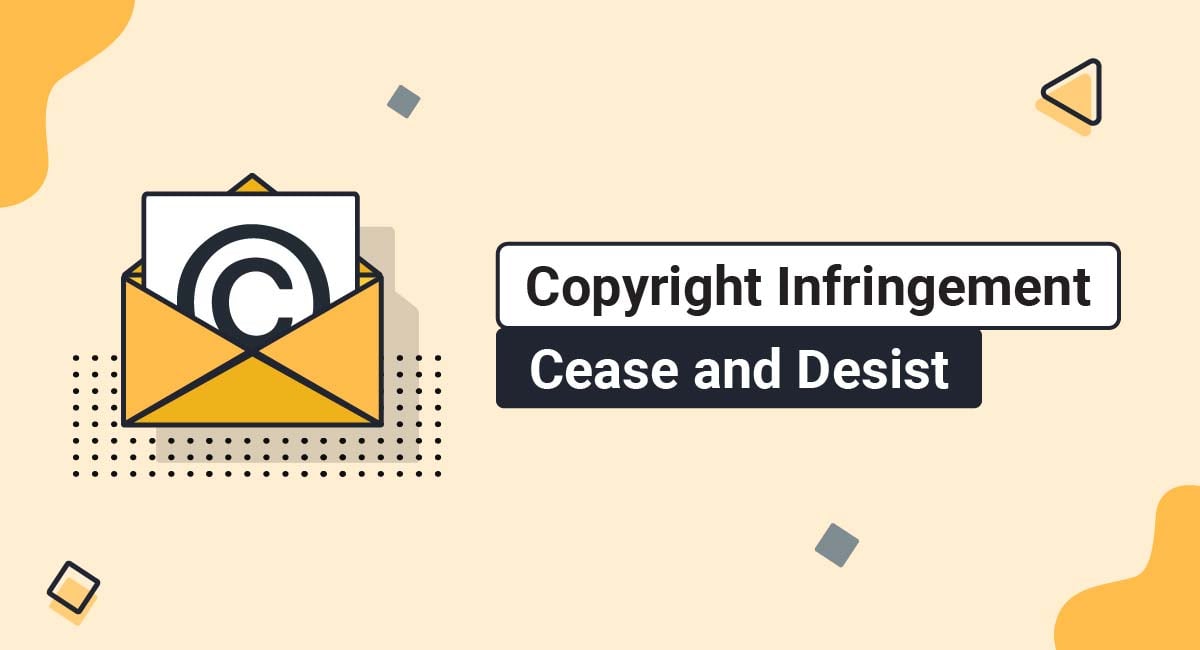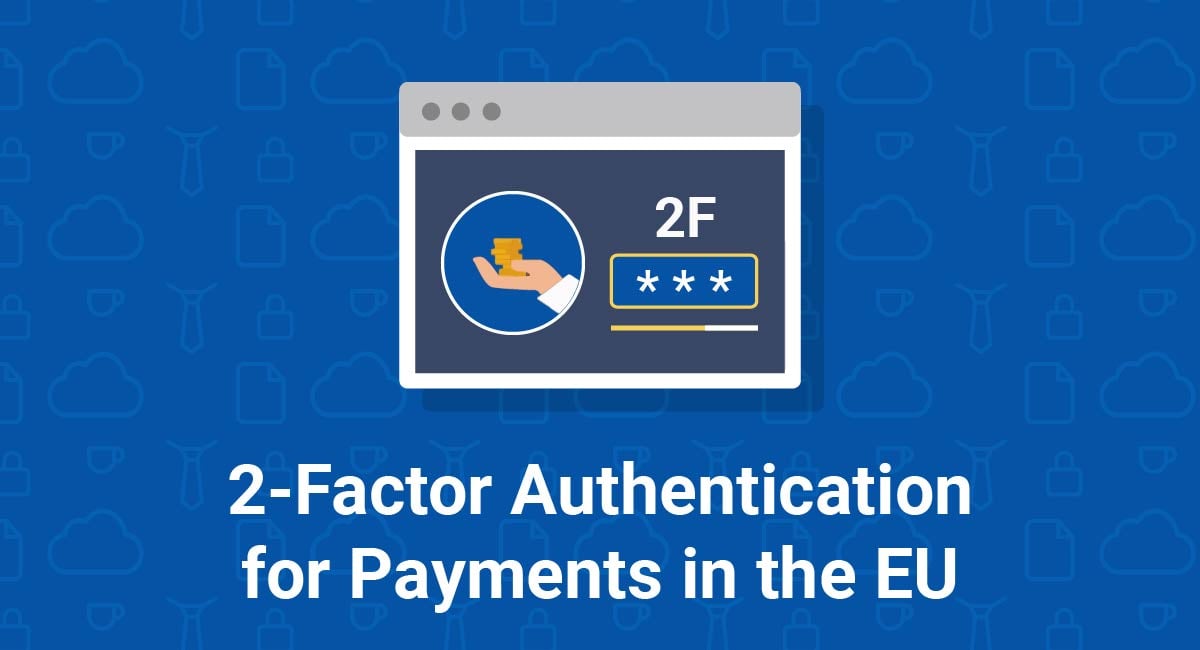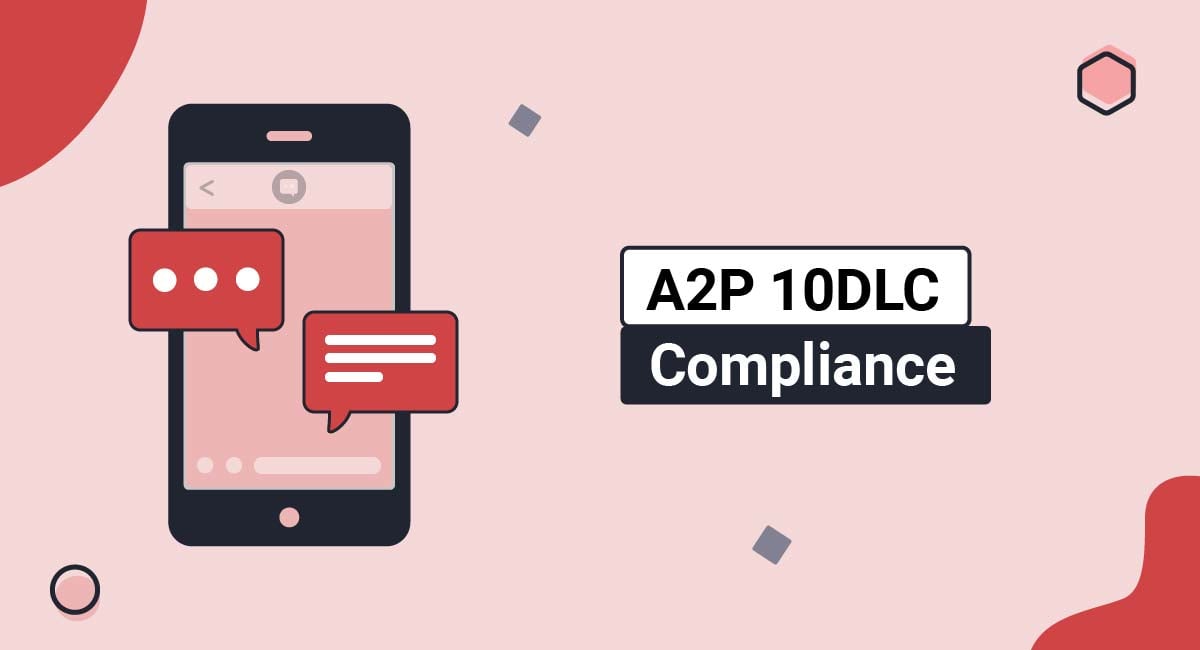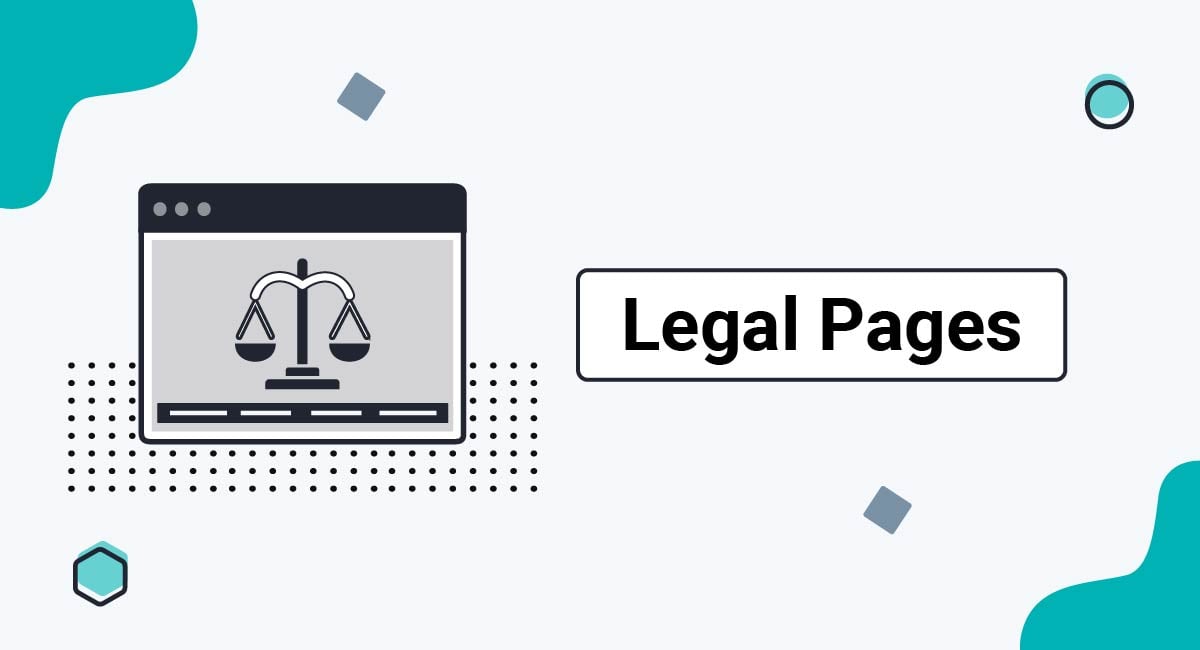Whether you make your original content available online in the form of blogs, photos, audio files, or computer software, you risk plagiarism or unauthorized use that can affect your bottom line and your reputation.
Copyright infringement is when someone copies, sells, or uses your original work without permission. If you hold a copyright for the material that has been used without your consent, you have the right to bring a lawsuit against the individual or entity that is illegally using your work. That said, you may want to try to put an end to the copyright infringement with a cease and desist letter before turning to litigation.
A copyright infringement cease and desist letter is a document that can help you stop copyright infringement activities without having to go to court.
This article will explain what a copyright infringement cease and desist letter is, how to write one, and how to prevent copyright infringement in the first place.
What customers say about TermsFeed:
This really is the most incredible service that most website owners should consider using.
Easy to generate custom policies in minutes & having the peace of mind & protection these policies can offer is priceless. Will definitely recommend it to others. Thank you.
- Bluesky's review for TermsFeed. Read all our testimonials here.
With TermsFeed, you can generate:
- 1. What is Copyright?
- 2. What is a Copyright Infringement Cease and Desist Letter?
- 2.1. Fair Use Doctrine and Licensing
- 3. How to Write a Copyright Infringement Cease and Desist Letter
- 3.1. Identify Yourself and Your Copyrighted Work
- 3.2. Explain the Problem
- 3.3. List Your Requests
- 3.4. Describe the Consequences of Noncompliance
- 4. What Happens After You Send a Cease and Desist Letter?
- 5. Digital Millennium Copyright Act Takedown Requests
- 6. How to Prevent Copyright Infringement
- 6.1. Maintain Up-to-Date Legal Documents
- 6.1.1. Terms and Conditions Agreement
- 6.1.2. EULA
- 6.1.3. Privacy Policy
- 6.1.4. Copyright Policy
- 6.2. Get Consent to Your Legal Agreements
- 7. Summary
What is Copyright?
Copyright is a type of intellectual property law that protects both published and unpublished works.
You don't have to register your work in order for copyright protection to apply to you. Simply creating an original work in a tangible form is all it takes for the law to kick in. However, if you decide to sue someone for copyright infringement, you will need to register your work with the U.S. Copyright Office.
What is a Copyright Infringement Cease and Desist Letter?

A copyright infringement cease and desist letter is a document that you send to an individual or entity if you believe they have engaged in copyright infringement. It explains that the recipient must stop using your copyrighted material, and/or compensate you for its use, or else risk a lawsuit.
While not legally binding, a cease and desist letter can be helpful in resolving copyright infringement issues without having to file a lawsuit.
A copyright infringement cease and desist letter can serve the following functions:
- Educate the offending party about your ownership of the work
- Request an end to copyright infringement activities
- Request financial compensation for the unauthorized use of your work
A cease and desist letter should describe the nature of the copyright infringement and include a request to end the unauthorized use of your work immediately.
It should also let the recipient know what next steps are required on their behalf, and what will happen if they don't respond to your request.
Fair Use Doctrine and Licensing
There are circumstances in which people can use portions of your original works without having to get permission. The Fair Use Doctrine allows individuals to use copyrighted work without authorization in certain cases. The Fair Use Doctrine may apply to the following areas:
- Criticism
- Commentary
- Reporting
- Research
- Teaching
Individuals may use parts of your work in these areas if the Fair Use Doctrine applies to them. However, it's always best to ask permission before using copyrighted work.
Section 107 of the Copyright Law of the United States describes the factors considered when determining what constitutes fair use:
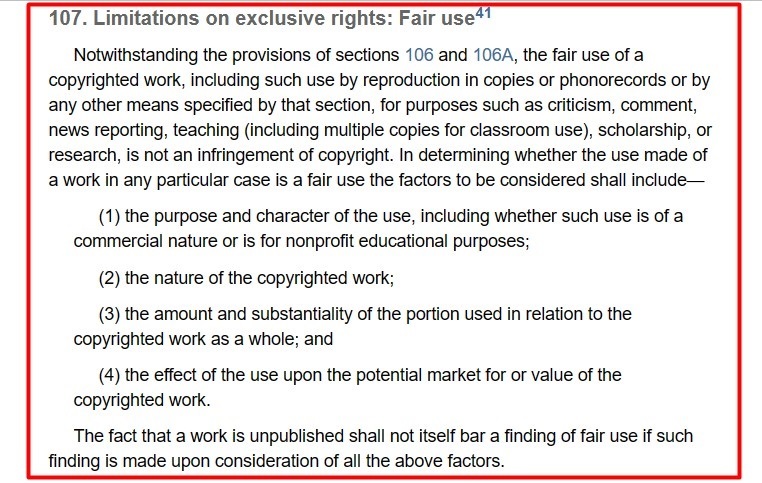
Many businesses provide temporary licenses allowing individuals to access or use their copyrighted work for a specified period of time.
For example, GitHub's End-User License Agreement (EULA) informs users that they may use as many copies of its software as they please, as long as their purposes for using the copies are lawful and in compliance with all of the terms in its EULA.

As long as users abide by the terms of an organization's licensing agreement, they are permitted to use its work without risking copyright infringement.
How to Write a Copyright Infringement Cease and Desist Letter

Your copyright infringement cease and desist letter should be customized to your unique situation and should include information about your copyrighted work.
Identify Yourself and Your Copyrighted Work
Open your cease and desist letter by explaining that your work is original, belongs to you, and is copyrighted. Include a description of your copyrighted work here.
If possible, include the title of the work, the U.S. Copyright Registration Number, and a copy of the work in question.
Marvel Entertainment's cease and desist letter starts by introducing itself and informing the recipient that it owns the copyrights for certain popular characters:

Explain the Problem
In this part of the letter, you are explaining why you believe the recipient is engaging in copyright infringement. Add details here describing exactly how their use of your work constitutes copyright infringement.
Marvel's cease and desist letter goes on to explain that it has become aware that the recipient has been making, marketing, and selling garments portraying its copyrighted designs, which constitutes copyright infringement:

List Your Requests
You will need to clearly describe the actions you want the recipient to take. Inform the recipient that they need to immediately stop using, sharing, or selling your work, and that they either return all copies of your work to you or destroy them.
You may also request a licensing fee or monetary settlement, depending on how they have used your material.
Finally, let them know the time frame in which they need to comply with your requests in order to avoid a lawsuit.
Marvel lets the recipient know that it should immediately stop marketing and selling products featuring its designs, and demands that the company cancels all customer orders for products with Marvel-based characters, respond in writing letting it know that it will stop using Marvel-themed materials, and remove all Marvel references or images from the website within five business days:
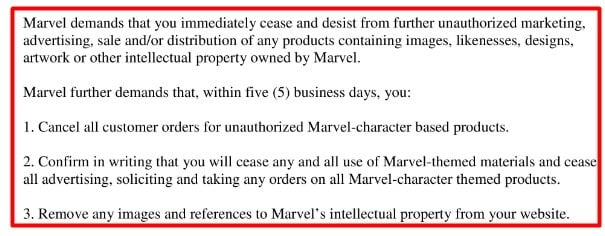
Describe the Consequences of Noncompliance
You should finish your cease and desist letter by letting the recipient know that they do not comply with your requests that you may take legal action against them.
Marvel ends the letter by explaining that it may take legal action if that is what "best protects its interests."

Your copyright infringement cease and desist letter should be sent by certified mail to ensure that the recipient receives it.
What Happens After You Send a Cease and Desist Letter?

Ideally, after you send a copyright infringement cease and desist letter the recipient stops using your work illegally. If, however, they ignore your cease and desist letter and continue engaging in copyright infringement, you may need to get a lawyer who specializes in copyright law and file a lawsuit.
If the copyright infringement activities are being done willfully to make a profit, the U.S. Attorney may also conduct a criminal investigation.
Digital Millennium Copyright Act Takedown Requests
The Digital Millennium Copyright Act (DMCA) is a 1998 copyright law that protects online service providers (such as Google or social media platforms) from copyright infringement litigation in exchange for allowing copyright owners to request that the providers take down copyright infringing material.
If you have found your copyrighted material on a DMCA-compliant platform, you can make a DMCA request to have your copyrighted content taken down.
Google uses its DMCA Policy to let users know that if it receives a notice that it is hosting copyright infringing content in Google Cloud Storage, it will "remove or disable access to" that content:
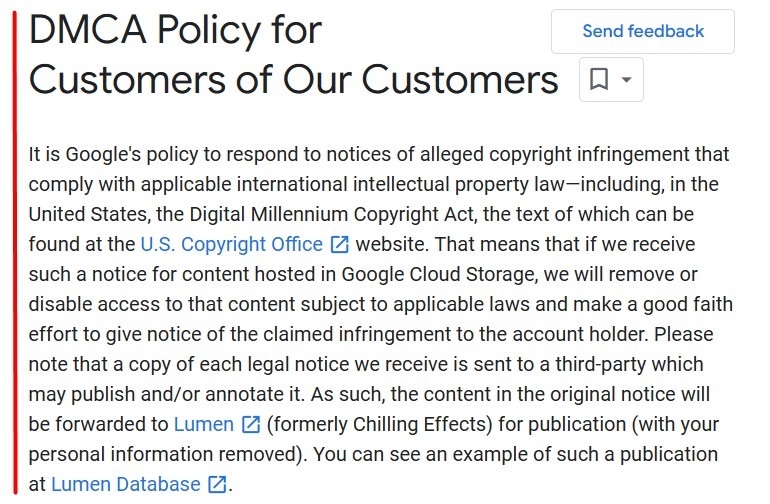
Next we'll look at some ways you can help prevent copyright infringement so you can get to the root cause of this issue.
How to Prevent Copyright Infringement

While it's ultimately the responsibility of your users to not engage in copyright infringement, there are some actions you can take to prevent copyright infringement.
Maintaining up-to-date legal agreements on your website that include copyright-relevant clauses and making sure users read and agree to your terms can help ensure that they understand the rules of use for your materials.
Maintain Up-to-Date Legal Documents
One of the most effective ways to inform users about your rules for accessing and using your work is to include them within your legal agreements, such as your Terms and Conditions agreement, EULA, Privacy Policy, or Copyright Policy.
It's a good idea to include copyright information in the legal policies for your mobile app as well, to protect both your app and your users, especially if users share user-generated content (UGC) on your app.
Terms and Conditions Agreement
A Terms and Conditions agreement (also referred to as a Terms of Service or Terms of Use agreement, or simply Terms) is a legal document that informs users what they need to agree to in order to use your products or services.
A Terms and Conditions agreement typically includes clauses concerning the services you provide, details about billing and payments, the rules users must abide by in order to do business with you, and what happens when a user's account is terminated. You can include a copyright-specific clause within your Terms and Conditions agreement to explain how users are allowed to utilize your content.
Skechers' Terms and Conditions agreement explains that all of the content on its site is copyrighted, and lets users know about its content reproduction and distribution limits:
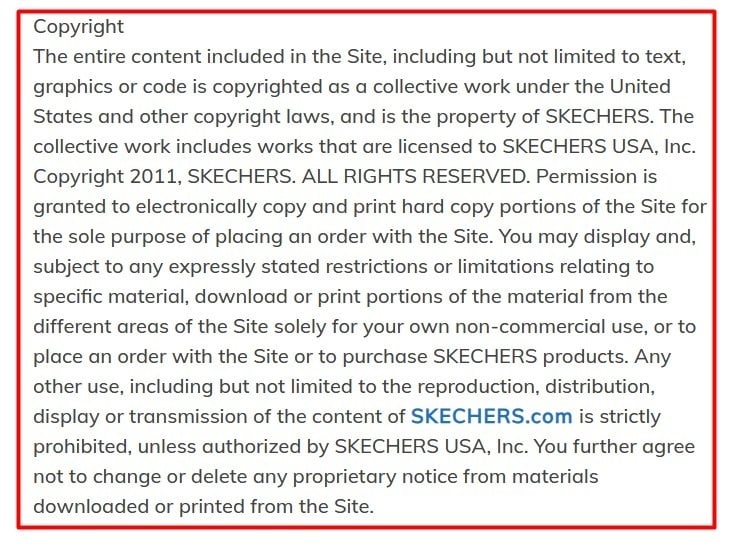
Photos, posts, and other original content found on social media platforms can be copyrighted. However, most social media sites require users to grant them and other users a license to access and use their content.
Pinterest's Terms of Service agreement lets users know that they must grant Pinterest and its users a license to use their content in order to use its services:
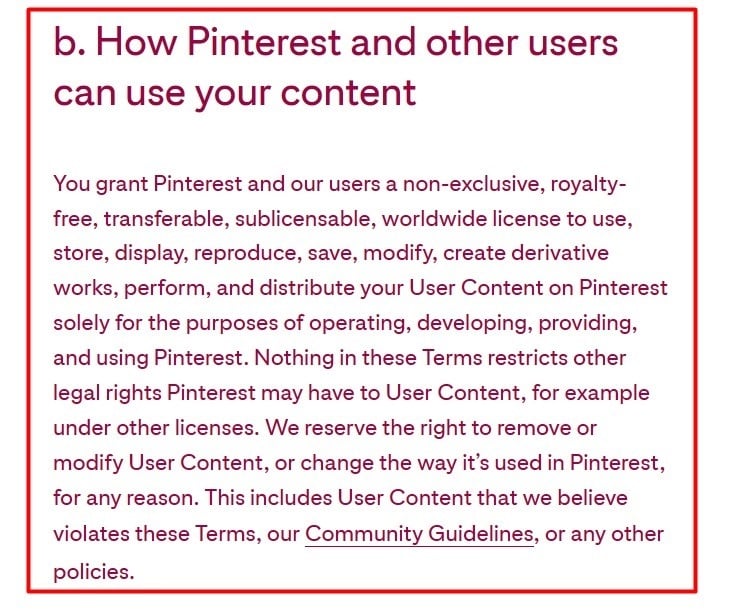
EULA
An End User License Agreement (EULA) is similar to a Terms and Conditions agreement in that it provides a set of rules for how users should use your product or service.
However, a Terms and Conditions agreement tends to be broader in scope than a EULA, as a EULA generally grants users a license to use the company's software and explains how users must behave in order to retain the license.
Adding a copyright clause to your EULA can help ensure that users understand any restrictions for using your software.
Take-Two Interactive Software's agreement grants users a limited license to use its software, and explains that its software is copyrighted and cannot be copied or distributed without its permission:
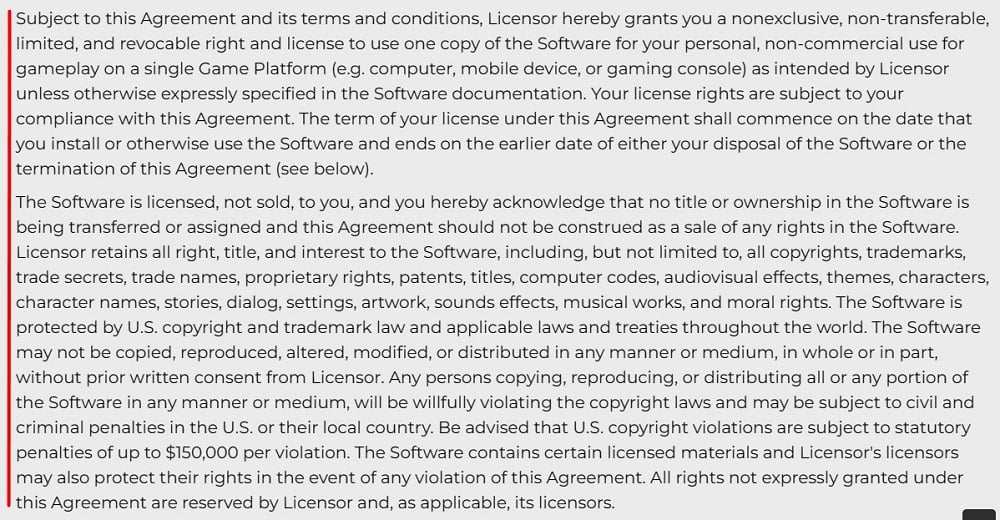
You can also reference APIs in your EULA.
Application programming interfaces (APIs) are software interfaces that are used to enable different apps to communicate with one another. For example, whenever you use Facebook to log in to another app, you're relying on an API to access data from one app to use in another.
Is an API copyrightable? While an API might meet the U.S. Copyright Office's requirements of an original, creative work, it may also be defined as a functional aspect of a computer program. U.S. copyright law does not currently extend to the "functional aspects" of a computer program, such as algorithms (which include coding).
According to the U.S. Copyright Office's Copyright Registration of Computer Programs PDF, computer programs are copyrightable, but the law does not cover the functional aspects of a computer program, including coding.
So what does that all mean, are APIs copyrightable or not? The answer is: not really.
In 2010, major tech corporation Oracle sued Google for copyright infringement for using over 11,000 lines of code from Oracle's Java API. The Supreme Court decided in Google's favor in 2021, saying that Google's use of Oracle's code fell under fair use practices. However, the Supreme Court did not directly address the question of whether APIs are copyrightable.
Copyright law is a living set of principles that is subject to change as the world around us changes. While APIs may not currently be copyrightable, you can still protect your work by including API-specific clauses within your legal agreements.
Marketo informs users that they must abide by its API Limits in order to receive a license to use its API:

Marketo's API License Agreement lets users know that they must not delete or alter its copyright, and must refrain from commercially using or distributing its API, or sharing it with any end users or other third parties:
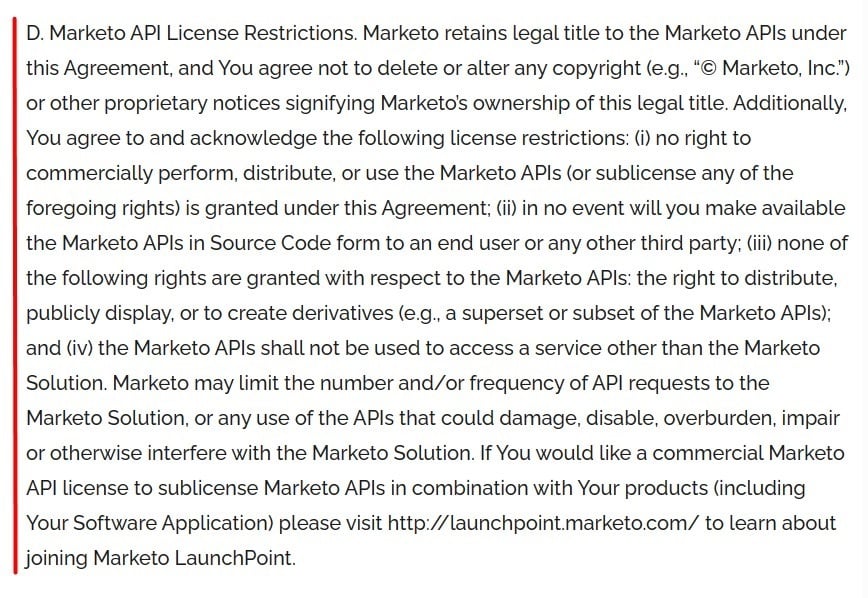
Privacy Policy
A Privacy Policy is a document that describes how you collect and process users' personal information and how you keep it safe.
While businesses don't typically put copyright-related clauses within their Privacy Policies, many do add links to their Terms and Conditions agreements, which will contain such clauses.
State and global privacy and data protection laws require applicable businesses to maintain a regularly updated Privacy Policy on their websites. Having a Privacy Policy can help you keep your side of the street clean and show users that you handle their personal information with care.
Harvard Library keeps its Privacy Policy, Terms of Use agreement, and copyright restrictions all on the same page so that users can easily access pertinent information:

Copyright Policy
Some organizations include a Copyright Policy as part of their legal documents. A Copyright Policy contains information about copyrighted content and what steps users can take if they believe copyright infringement has occurred. It can also contain information about how to make a DMCA request.
Spotify's Copyright Policy includes details about how users can submit a notice of copyright infringement, either through an online form or via email or physical mail, and what kind of information the notice should contain:
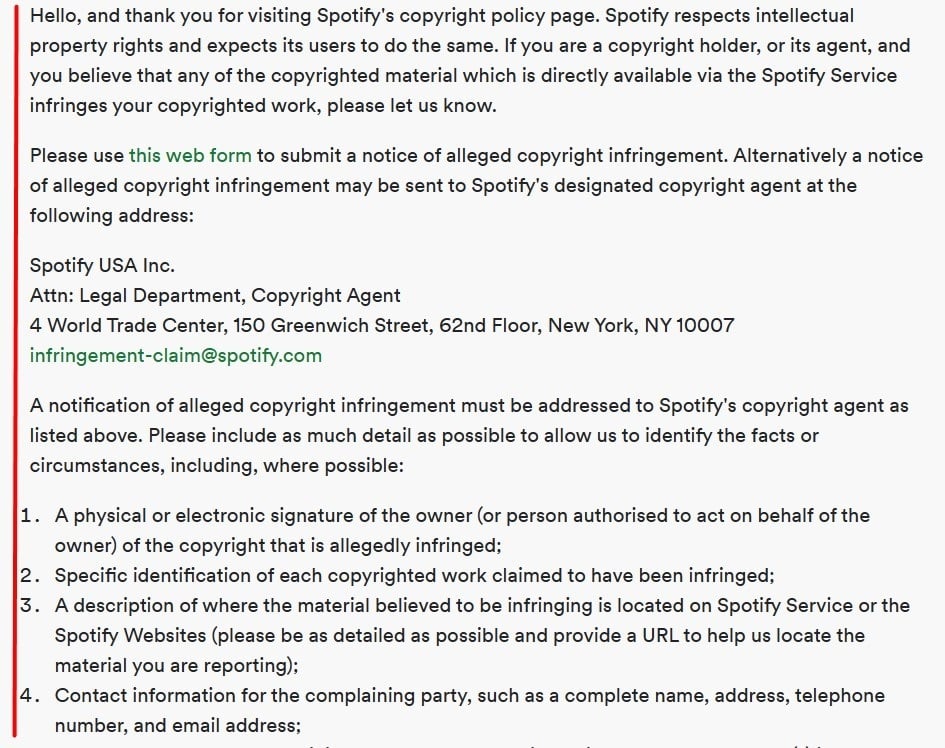
TikTok describes its copyright information, including how users can file a Copyright Infringement Report if they believe another user is infringing on their copyrighted content:
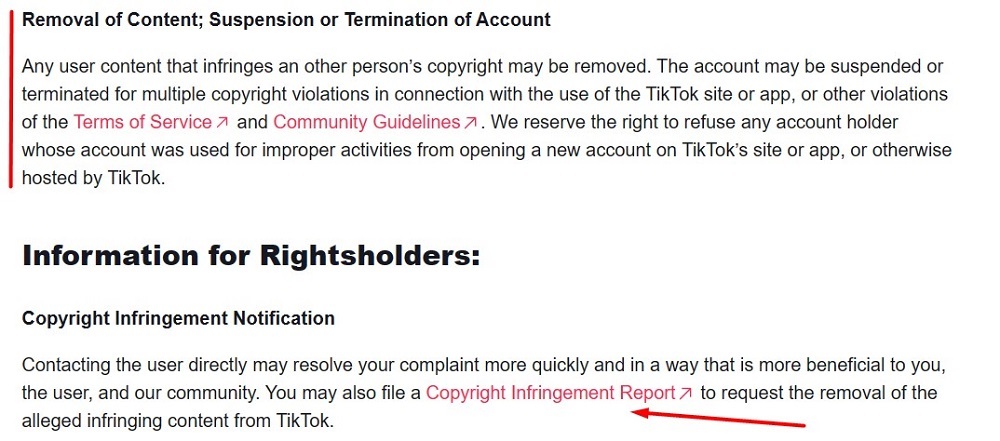
Get Consent to Your Legal Agreements
Whether you have a Terms and Conditions agreement, a EULA, a Privacy Policy, a Copyright Policy, or all four, it's essential that you get user consent to these documents.
Many state and global privacy and data protection laws require you to get active consent to your legal policies, meaning simply having a statement in your document that says users must agree to your terms isn't enough.
To get active consent, you can use a clickwrap agreement, which requires users to click a button or tick a checkbox next to a statement saying that they have read and agree to the rules laid out in your legal agreement(s).
When users go to create an account with American Airlines, they must tick a box affirming that they agree to its Terms and Conditions before clicking the Continue button:
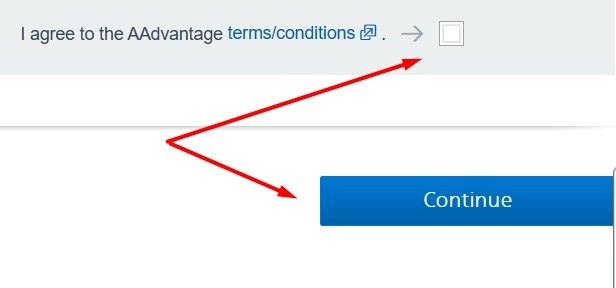
Next we'll look at some additional points to consider when it comes to digital
Summary
Copyright law protects your original content from being copied, shared, or sold without your permission.
Copyright infringement is when someone uses your work without authorization.
You can send a copyright infringement cease and desist letter to anyone you believe is engaging in copyright infringement. A cease and desist letter informs the recipient that you own the copyrighted material, and requests that they immediately stop using that material. It provides a timeline for when the behavior should stop and when the recipient should respond by.
A cease and desist letter can be sent as a first step before copyright litigation. You may also wish to send a DMCA request to complying service providers.
To prevent copyright infringement and keep your users informed, you should maintain up-to-date legal policies, including a Terms and Conditions agreement, a EULA, and a Privacy Policy. You may also want to include a Copyright Policy specifically for copyright information and DMCA requests.
To ensure that users have read and agree to your policies, you should have a mechanism in place for getting active consent to your legal documents.

Comprehensive compliance starts with a Privacy Policy.
Comply with the law with our agreements, policies, and consent banners. Everything is included.
